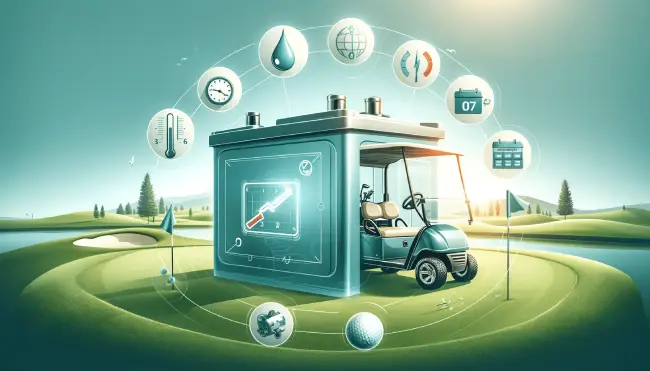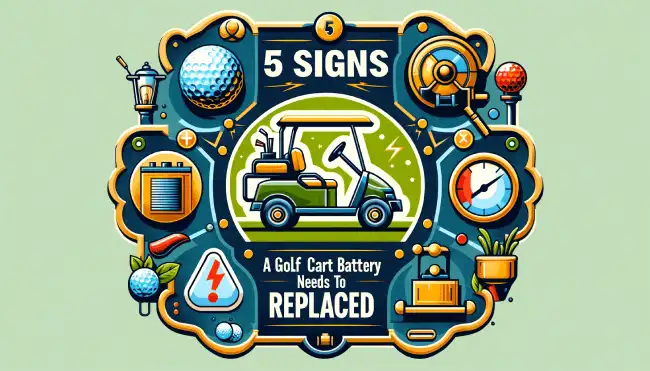Golf carts are now an important part of the game because they make things easier and faster on the course. The battery is one of the most important parts of a golf cart. As an expert with eight years of experience in golf, I’m Steve, and I’ll help you figure out how long golf cart batteries last and how to make them last longer.
Average Lifespan of Golf Cart Batteries
The average lifespan of golf cart batteries is an important factor to take into account because it has a direct effect on how much they cost to own and how well they work. Lead-acid and lithium-ion batteries are the two main types of batteries used in golf carts.
General Lifespan
Golf cart batteries, particularly lead-acid ones, have an average lifespan of around 4 to 6 years when properly maintained. However, this can vary based on several factors, including the type of battery, usage patterns, and maintenance practices. Lithium-ion batteries, on the other hand, tend to have a longer lifespan, often exceeding 8 years with proper care.
Lead-Acid vs. Lithium-Ion
It’s important to understand the differences between these two battery types. Lead-acid batteries are more common due to their affordability but have a shorter lifespan compared to lithium-ion batteries. Lithium-ion batteries, although pricier, offer an extended lifecycle, making them a cost-effective choice in the long run. Lithium-ion batteries, although pricier, offer a longer lifespan, making them a cost-effective choice in the long run.
- Comparison Chart: Lead-Acid vs. Lithium-Ion Golf Cart Batteries
| Feature | Lead-Acid Batteries | Lithium-Ion Batteries |
|---|---|---|
| Lifespan | 4-6 years | Up to 10 years |
| Maintenance | Requires regular water level check and terminal cleaning | Minimal maintenance required |
| Initial Cost | Less expensive | More expensive |
| Efficiency | Less efficient in charging and discharging | More efficient in charging and discharging |
| Weight | Heavier | Lighter |
| Environmental Impact | Higher due to more frequent replacements | Lower due to longer lifespan and efficiency |
This chart provides a straightforward comparison, showing that while lead-acid batteries are more affordable and familiar, lithium-ion batteries offer a longer lifespan, greater efficiency, and are more environmentally friendly despite a higher initial cost. Making the right choice depends on your specific needs, budget, and preferences.
Remember, regardless of the battery type you choose, proper maintenance and usage are key to maximizing the battery’s lifespan and performance.

What are the Factors That Influence the Lifespan of a Golf Cart Battery?
Quality
The quality of the battery itself is a significant determinant. Higher-quality batteries tend to last longer and perform better.
Charging Techniques
Overcharging or undercharging can significantly reduce battery lifespan. It’s important to use smart chargers and follow the manufacturer’s instructions.
Maintenance
Regular maintenance, such as cleaning the battery terminals, checking fluid levels (for lead-acid batteries), and ensuring tight connections, can extend the battery’s life.
Type of Battery
Golf cart batteries come in different types, such as lead-acid, AGM, and lithium-ion, each with its own lifespan and maintenance requirements. Selecting the right battery type for your needs and usage patterns is crucial.

5 Signs a Golf Cart Battery Needs To Be Replaced
Golf cart owners need to know how to tell when their batteries are starting to fail so that their vehicles work properly and reliably. Here are some usual signs that it’s time to think about getting a new battery.
Decreased Run Time
One of the first signs is a noticeable decrease in the distance your golf cart can travel on a single charge. If you find yourself needing to recharge more frequently or running out of power sooner than usual, it’s likely a battery issue.
Longer Charging Times
Batteries often take longer to fully charge as they age. If you notice that the charging process is becoming increasingly time-consuming, it’s a clear signal that your batteries are aging.
Swollen or Bulging Battery Case
Visually inspect the batteries for any changes in their shape. Bulging or swelling battery cases, leaks, or corrosion on the terminals are all signs of getting worse. These issues can compromise the safety and performance of your golf cart.
Unusual Noises
Strange noises, such as hissing or sizzling sounds, during charging or operation can indicate internal problems within the battery. These noises should not be ignored and require immediate attention.
Performance Drops
A noticeable reduction in your golf cart’s overall performance, including slower acceleration and reduced speed, is caused by batteries that are dying and need to be replaced.
As for when to replace your golf cart battery, it’s advisable to do so when any of the above signs show up. Delaying replacement can lead to reduced performance, potential safety hazards, and increased maintenance costs.

How to Make Golf Cart Batteries Last Longer – Tips and Tricks
To maximize the lifespan of your golf cart batteries and ensure they operate at peak efficiency, it’s essential to follow proper maintenance practices. Here are some valuable tips:
Proper Charging Practices
Use the right charger for your battery type (lead-acid or lithium-ion) and follow manufacturer guidelines. Do not overcharge your battery, as it can cause premature degradation of the battery. Buy smart chargers that turn off by themselves when the battery is fully charged.
Maintain Fluid Levels
If you have lead-acid batteries, make sure you check the fluid levels often. Fill up any cells that are low with distilled water to make sure the plates stay submerged. Keeping the right amount of fluid in these batteries is very important for their longevity and performance.
Reduce the risk of corrosion
Corrosion on battery terminals is a common issue. To prevent it, regularly clean the terminals with a mixture of baking soda and water, using a wire brush if needed. After cleaning, apply a thin layer of petroleum jelly or terminal protector to stop corrosion from happening again.
Store your batteries properly
If you’re going to put your golf cart away for a long time, you need to make sure the batteries are stored correctly as well. Take the batteries out, clean them, and put them away fully charged. Charge them every couple of weeks to keep them from sulfating, which can happen when they are stored for a long time.
Environmental Factors
Environmental conditions can significantly impact battery lifespan. Extreme temperatures, both hot and cold, can shorten the life of golf cart batteries. Store your cart in a cool, dry place when not in use, and consider insulated battery blankets in cold climates.
FAQs
Q: How long do golf cart batteries last on average?
A: Golf cart batteries typically last around 4 to 6 years for lead-acid batteries and over 8 years for lithium-ion batteries when properly maintained.
Q: Can I use a car battery in my golf cart?
A: No, car batteries are not suitable for golf carts. Golf cart batteries are designed for deep cycling, providing consistent power over extended periods, while car batteries are meant for short bursts of high current.
Q: How should I store my golf cart batteries during the winter months?
A: Store your golf cart batteries in a cool, dry place. Fully charge them before storage and recharge them periodically to prevent sulfation.
Q: Do I need to water lithium golf cart batteries?
A: No, lithium batteries are maintenance-free and do not require watering like lead-acid batteries.







